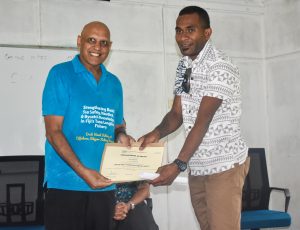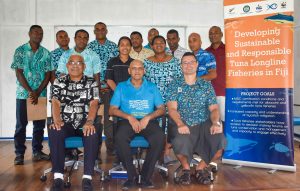

Deck Hand Fishing programme graduate Jone Qolikira receives his certificate from FMA Chief Executive Officer, Mahesa Abeynayake.
Deck Hand Fishing programme graduate from Fiji National University’s (FNU) Fiji Maritime Academy (FMA) Jone Qolikira believes seafarers working on fishing vessels need to understand the importance of sustainable fishing practices, especially the safe release of bycatch.
Qolikira was among the 11 students who recently graduated in the programme after a four-week intense theory and hands-on training on basic sea safety, nautical knowledge and bycatch knowledge.
According to Qolikira, the training has equipped him with a better understanding of why fishermen need to be highly environmentally responsible.
“I have worked for seven years on fishing vessels and this short course has been an eye-opener for me because it was the first time during the course that I learnt what bycatch is,” he said.
“We catch these fish or other marine species such as turtles unintentionally and do not have the right knowledge on how to release them back into the sea safely.”
Qolikira said he was unaware of the specific equipment used to ensure the safe release of the bycatch.
“During the training, we used precise equipment and I was amazed at how it works to ensure sustainable fishing practices is observed at all times.”
The 29-year-old is looking forward to boarding a fishing vessel and putting his skills and knowledge into practice that he gained during the programme.
FMA Chief Executive Officer, Mahesa Abeynayake highlighted that the graduates were equipped with two important elements required for seafarers on a fishing vessel – essential knowledge and skills that are embedded in the Deck Hand Fishing programme.
“First is personal safety awareness of a hazardous profession. The basic first aid training imparts competency necessary not only to look after themselves but also caring for others. For instance, fighting a fire on board as well as actions in an emergency and training often needed to save the vessels and others.”
“The second one is the importance of protecting the maritime environment and the sustainability of pristine oceans.”
“Rules and regulation of properly dealing with maritime species that are caught accidentally have been an integral and driving force in developing the curriculum. This component is an essential part of the topic of by-catch mitigation. So its awareness of marine pollution mitigation methods focusing on common pollution offences especially by fishing vessels is also part of the curriculum,” said Abeynayake.
The 11 graduates joined a group of 48 students who graduated last year. Of the 11, nine were males and there were two female graduates.
The students were sponsored under the Developing Sustainable and Responsible Tuna Longline Fisheries in Fiji project, funded by the New Zealand government. The project is a partnership between FMA, Fiji Fishing Industry Association (FFIA), Fiji Ministry of Fisheries (MoF) and the World Wide Fund for Nature (WWF).

Graduates with FMA CEO, Mahesa Abeynayake (first row – middle) together with WWF rep and FMA staff.